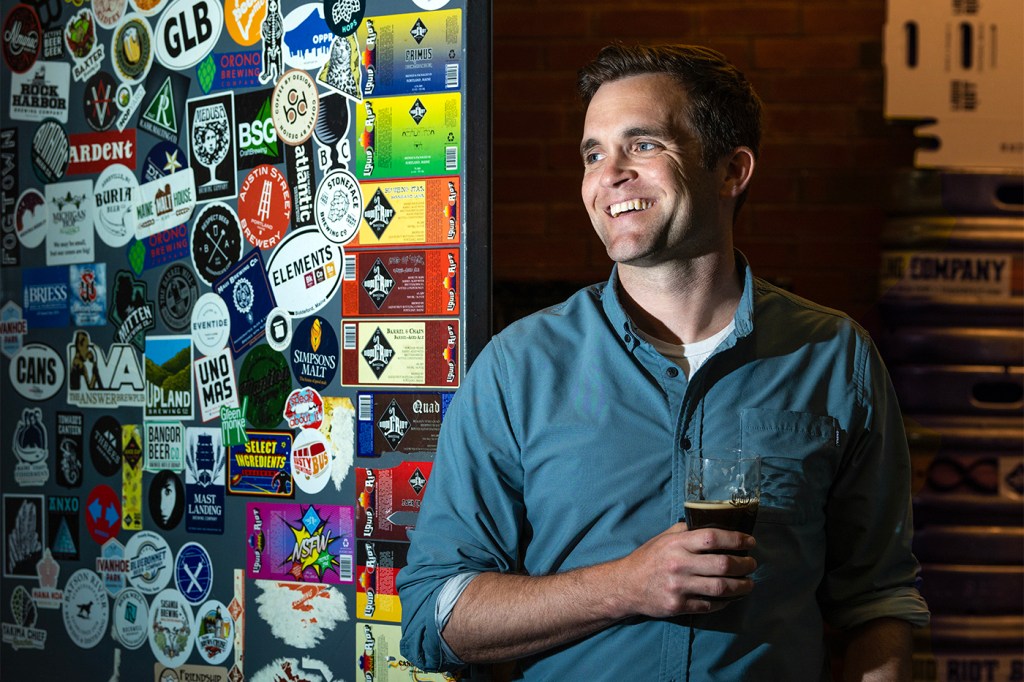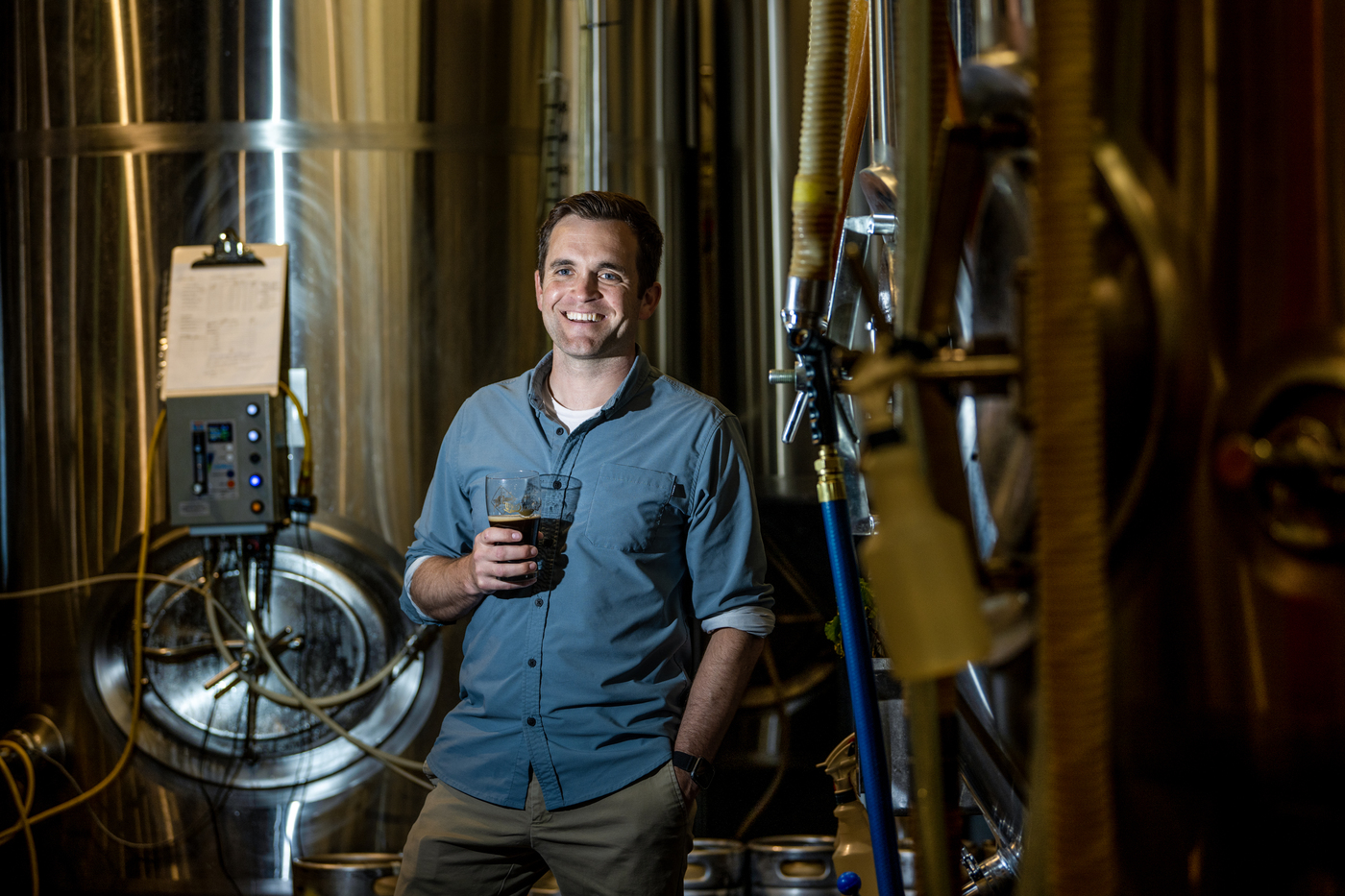From craft beer to crafting code. Maine Brewers’ Guild head leaves to pursue degree at Roux Institute

PORTLAND, Maine—Sean Sullivan knows a lot about beer. He can easily rattle off a long list of the best breweries in Portland, Maine, but he can also walk you through the malting process that prepares barley for brewing.
It certainly helps that for the last decade Sullivan has served as the executive director of the Maine Brewers’ Guild. As the voice for the Pine Tree State’s burgeoning brewery business, Sullivan has helped lead the charge for a new form of economic and cultural growth in Maine.
But now Sullivan is leaving it all behind for something completely different: computer science.
Sullivan recently stepped down from his role at the guild to pursue a computer science master’s degree at the Roux Institute at Northeastern University in Portland.
“I love the industry, and I love what the industry has done for Maine,” Sullivan says. “It’s such a tight-knit community. I’m passionate about more things beyond that.”
The sudden shift from craft beer to crafting code might seem strange at first, but it’s actually the logical next step for a serial entrepreneur who has always had one eye on the future and the other on Maine.
Sullivan has been hustling and coming up with money making schemes since he was a kid. At Bowdoin College, Sullivan made a habit of buying and selling broken iPhones on Ebay to earn some extra cash.
By the time he graduated in 2008 with a degree in art history, Sullivan knew two things: He wanted to stay in Maine and he wanted to be an entrepreneur. As he found out through some early business ventures, those two things go hand in hand. He says the state has strong community ties and a healthy local business culture that helped make one of his early ideas, Buoy Local, a gift card for local businesses, into a success.
“In Maine, if you really wanted to get a coffee with the governor of Maine, I think you could do it,” Sullivan says. “There’s this level of approachability to your average Mainer and this desire to help each other while not interfering with each other that just permeates.”
Sullivan, along with his now-former business partner who he had met at an “eye-opening” startup weekend in Portland, launched Buoy Local in 2011. The idea was built on the already strong buy-local community in Portland and was a manifestation of Sullivan’s interest in sustainability and fostering connections through business.
After selling Buoy Local to Bangor Savings Bank, Sullivan saw a job posting for the Maine Brewers’ Guild executive director role and jumped at the opportunity. He had limited brewing experience and the position was part-time, but Sullivan saw another place he could help foster growth.

Although the brewery industry is now a strong player in Maine’s economy, that wasn’t the case when Sullivan joined the guild in 2013.
At the time there were only 45 breweries and selling legislators on the idea that beer could be Maine’s next economic driver was still a tall task. He remembers politicians literally laughing in his face when he would testify at public meetings.
“When I first started in this job, [the response] was like, ‘This is beer. Why should we care about the beer industry in Maine? It’s a vice industry. It’s not that important,’” Sullivan says.
Sullivan started pitching the brewery industry as an extension of Maine’s local, craftsman-driven economy and a way to bring in more diverse audiences for Maine’s tourism industry.
“It’s not about the alcohol,” Sullivan continues. “It’s about people starting businesses in small towns that serve as community gathering spaces and provide an economic impact that goes far beyond producing a product to sell.”
It also helped that the brewery industry was seeing some growth around the same time.
In 2011, Maine had passed laws that allowed breweries to sell beer on the same site where they make it, priming the state––and breweries––for new economic opportunities. Sullivan started seeing breweries open in cities like Bangor as Mainers jumped headfirst into brewing. Then farm owners started cashing in too, selling barley, which they were already growing, to local breweries.
In the decade Sullivan has spent with the guild, the number of breweries in Maine has jumped from 45 to more than 170. And the economic impact is immense, based on the guild’s most recent economic impact study.
“Incredibly, we found that, in terms of production and sales, [the brewery industry] was nearly on par with the lobster industry,” Sullivan says.
With all that he’s helped build, why step away now? Sullivan says his strengths and interests as an entrepreneur are in growth, and the Maine Brewers’ Guild now has the infrastructure in place to maintain and sustain its success. He also had a blossoming interest in new digital frontiers and the communities that were finding a home there.
It was another growth opportunity––and the Roux Institute’s computer align program was the perfect chance to get started with helping Maine in yet another way.
“With the Roux, I saw an entity that has a really ambitious growth plan for the community,” Sullivan says. “I just see them as foundational in the economy of the future.”
“I want my son to see somebody who’s constantly trying something new,” Sullivan adds. “There’s a lot of people in Maine who want to make incremental change but only a few that want to make a serious, dramatic change.”
Cody Mello-Klein is a Northeastern Global News reporter. Email him at c.mello-klein@northeastern.edu. Follow him on Twitter @Proelectioneer.






